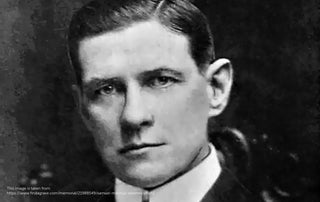Samuel Zwemer was a remarkable missionary, traveller and teacher, and a man who became known as the ‘Apostle to Islam’.
Zwemer was born in Michigan in 1867 to a Christian family who had moved from Holland to the United States where his father was a church pastor. Zwemer made a commitment to Christ in his youth and went to seminary to train as a pastor.
Along with a fellow student, Zwemer felt called to serve in the Arab World but, largely because missionary organisations had found ministry there to be unsuccessful, they could not find any organisation that would send them. The response of Zwemer was to simply set up their own organisation: the American Arabian Mission.
Zwemer journeyed to Yemen in 1890 where he was able to travel through several closed cities that had previously never been visited by Europeans or Americans. One result of these pioneering explorations was that the Royal Geographical Society made Zwemer a life fellow, something he always valued.
Zwemer moved to Bahrain where he settled down, serving for nearly fifteen years as a missionary who focused on evangelism and distributed Christian books. Other workers joined him and by 1902 a few small missions had been established along the impoverished coastline of the Arabian Gulf. Zwemer and his mission began schools and hospitals that were much in demand in this neglected area.
Zwemer became fluent in Arabic and had a deep knowledge of the Koran and of Islamic beliefs. Above all, he listened to how ordinary people understood their faith and their fears. Increasingly Zwemer decided that much previous missionary activity with Islam had been badly informed and too confrontational. On that basis he started writing and, despite the busiest of lives, wrote 50 books in as many years. Zwemer’s books – challenging, thoughtful and gracious – were enormously important in changing how the church thought about the Muslim world.
In 1896 Zwemer married Amy Wilkes, a missionary nurse who had come to work at the hospital in Bahrain. They had five children but in 1904 two of their young daughters died within weeks from disease. On their tomb in Bahrain the Zwemers had placed the inscription, derived from Revelation 5:12, ‘Worthy is the Lamb to receive riches.’
In 1905 Zwemer and the family moved to the United States where he took on the role of mobilising churches and Christians for the Middle East. In 1911 he began an important missionary publication – The Moslem World – and was to remain its editor for 35 years.
After seven years in the United States, the Zwemers moved to Egypt. Cairo, then the intellectual and educational centre of the Arab world, was an ideal place for Zwemer to write and to produce evangelistic literature. Increasingly recognised as an authority on missions, Zwemer now had a worldwide influence and travelled to conferences in the States and elsewhere where he spoke with great effect.
In 1929 Zwemer was appointed professor of missions at Princeton Theological Seminary and he and the family returned to the USA. There, with his unfailing energy, he continued to recruit people and gain support for overseas mission. Amy died in 1937 and a year later Zwemer retired, but continued writing and speaking. He died in New York City in 1952 at the age of eighty-four.
While Zwemer himself saw few converts, he was extraordinarily influential. Although he never departed from his confidence that salvation was only to be found in Christ, Zwemer altered how evangelism to Muslims was done. Rejecting a previous mission strategy that focused on attacking Islam as a theological system, he chose to concentrate instead on what Muslims as people found missing in what they believed in. That missing element he saw as a personal knowledge of a loving God which could only be found in Christ.
Let me suggest three things about Samuel Zwemer that are well worth considering.
First, Zwemer reached out through caring communication. He rejected any evangelism that was unloving and, in love, sought to reach out to people at their point of need. He was concerned too, not just simply to preach the gospel but to live it out, and the hospitals and schools that he helped create, witness to a preaching by word and deed. At the same time he unhesitatingly spoke out about the injustices he saw, such as the persistence of slavery and the abuse of women. There was a caring in his sharing.
Second, Zwemer reached out with intelligent involvement. He threw himself into the language and culture, mastering Islamic theology. Yet because he lived with local people, he knew what the beliefs and practices were of ‘the man on the street’ and, from his Amy, the ‘woman in the home’. For all his powerful intellect, Zwemer’s approach was never academic; it was always applied.
Finally, Zwemer reached out in sacrificial service for those he sought to reach. He endured much for the gospel. There was his unending labour of learning; reading and writing about the world he wanted to reach. There was also illness, bereavement and disappointment. Yet just before his passing Zwemer could write, ‘The sheer joy of it all comes back. Gladly I would do it all over again.’
Above all things, Samuel Zwemer put God first, writing: ‘The chief end of missions is not the salvation of men but the glory of God.’ He pioneered work amongst people who the church had ignored. Zwemer pointed the way to the gracious and faithful sharing of Christ with those who need to hear of him. His life raises a sobering question: who will follow in his footsteps?
J.John
Reverend Canon
This image is taken from https://www.findagrave.com/memorial/21988549/samuel-marinus-zwemer/photo




